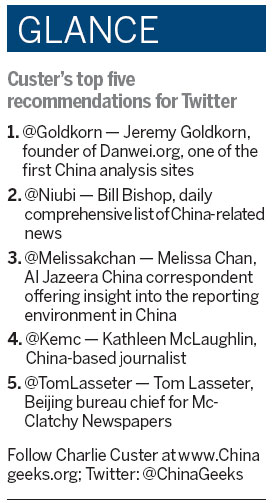The China geek
Updated: 2011-11-04 08:47
By Natalie Thomas (China Daily)
|
|||||||||
|
Custer's website China Geeks attracts up to 45,000 hits per month making it a popular China news resource. Provided to China Daily |
Young blogger digs deep into Chinese society through his popular website
Charlie Custer is not the average American in China. At just 25 the former Brown student from Connecticut operates a blog, which is considered to be one of the most essential sources of information on current events in China. Custer is a writer, translator, Chinese teacher, videographer and blogger.
His site chinageeks.org receives between 35-45,000 hits a month and has been mentioned in and linked to by the New York Times, the New Yorker, the Wall Street Journal and the Economist.
Now in the process of producing a documentary on child kidnapping, the man who shuns the title "China Expert" explains why understanding China is not the impossible task it is sometimes made out to be.
Custer first began blogging in 2009 after coming to the northern city of Harbin to teach English.
The blogger explains that setting up the site was initially more of a personal endeavour.
"I was looking for something that would force me to continue learning and paying attention to things here," he says.
"When you first come to China everything's crazy. You're learning something new every day but after a while you get used to it and that stops happening."
China Geeks found its niche in translating comments from the Chinese blogosphere, something which few China blogs were doing at the time.
Through his translation work Custer was able to bring a new angle and was soon gaining attention and linkage from other China blogs.
Over the past two years traffic to the blog has increased consistently due to its extensive coverage of major China events, and China Geeks itself has grown into a team of nine to 10 contributors.
China has always been a presence in Custer's life.
|
|
Having a father with a keen interest in Chinese philosophy meant growing up surrounded by traces of the Middle Kingdom; from bookshelves stocked with the works of Chinese thinkers, to a family cat called Mencius.
However, it was only when he reached university that China began to figure prominently in the blogger's life.
"In our freshman year we had to pick five supervisor classes from which we'd get assigned one. I'd picked four and I couldn't think of a fifth one, so I just thought 'whatever, I'll take a class in Chinese philosophy'.
"That was the class I ended up getting and I loved it."
Despite several years of following China events on a daily basis, Custer vehemently shuns the title of "China Expert".
"I would say in general shy away from anyone who calls themselves the 'China Expert'. I feel uncomfortable with the idea of an expert generally. Understanding everything about a certain field is something I think is unattainable.
"People should stop listening to me. The fact that I am considered by some people to be someone that you should listen to is an indication that not nearly enough people are really paying attention to China and what Chinese people say," he says.
The blogger rejects the claim often heard in both China and the West that the two cultures are at the fundamental level mutually un-knowable.
Custer was confronted with this during his time as a Chinese teacher in the United States.
"I had multiple students tell me they weren't physically capable of writing Chinese characters, I even had a mother call me up and tell me her son had to drop the class for this reason," he says.
"Rhetorically, China is the thing that we as a people don't understand. People say 'it's like Chinese to me'. Chinese people also use it as an excuse to blow off the West saying, 'ahh we're just too different; it would never work; we can't do things that way because that's not the way we do it in China'.
"I think anything that you are interested in understanding is understandable, and that includes China. What's more, the language is not as hard as people say. The tones are a pain, the characters are a pain but there are no verb conjugations. Nobody ever tells you that."
Custer has now begun to experiment with film. This year he and his wife started filming their first full-length documentary about kidnapping.
"Kidnapping was already something I was aware about when living in Harbin, and I could have written about it, but how many articles have been about children being kidnapped? You can read that 70,000 children are kidnapped each year, but that's just a number. At a certain point the thing that I can't offer with a blog is that personal connection of looking in someone's eyes and hearing them tell their story."
Thanks to a large network of followers online, Custer was able to raise around $8,500 toward producing the film, and he hopes to raise a further $5,000 in the coming months.
Filming itself has been both rewarding and challenging.
"Our trips are so depressing. Usually it involves us getting on a train to a small town where we watch some parents cry for a couple of hours before getting the train back. And that's how we spend our weekend."
The two filmmakers have also come across positive stories during the course of the project, most recently getting in contact with a group of parents whose children were kidnapped and taken to work in brick kilns in Shaanxi.
"These parents will actually get together, rent some vans and go to these places where they spread out like a co-ordinated army asking questions and taking pictures. Apparently they've rescued about 100 children this way."
The tentative release date for the film has been set for before the end of 2012. Beyond this Custer will continue to follow China in some way. "China is fascinating and it's changing so fast that I could never imagine I would stop following it," he says.
For those who want to further their understanding of China, Custer has the following recommendations: "Learn Chinese. Beyond that, just read. These days Twitter is a good source of information, if you follow all the right people you get a real feel for what's going on."













